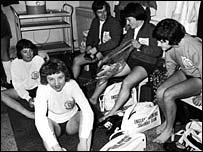BBC Sport's Patricia Gregory, who helped found the women's FA in the 1960s, charts how the game overcame prejudice and scorn to become today's most popular sport among girls.

England preparing for the first official women's international against Scotland in 1972
|
The earliest recorded women's football match anywhere in the world took place in 1895 in North London.
During the First World War the female workers of the munitions factories used to play matches because men were away fighting the war.
But in 1921 The FA became concerned that money raised ostensibly for charitable purposes was not finding its way to such organisations.
Their response - to pass a rule forbidding women from playing football - and that rule remained in force until December 1969.
This did not deter such stalwarts as the Dick, Kerr's Ladies of Preston or the Manchester Corinthians - but the spur for the growth of the game came with England's 1966 World Cup victory.
Clubs began to appear although it was difficult at first to locate them but in 1967 my team was contacted by Arthur Hobbs who was organising the Deal tournament for ladies football (as it was then known).
Arthur knew that we needed to be organised and over the next few years we formed our teams into leagues and in late 1969 the Ladies FA of Great Britain was born.
The name was swiftly changed to the Women's FA as we were advised that "women's" was a more inclusive word with "ladies" judged more suitable for the more demure pastime of golf!
In those days we included in our number the few teams of Northern Ireland, Scotland and Wales but eventually the other British men's associations pointed out that we could not govern their teams.

Dick, Kerr's Ladies blazed a trail for women's football in the 1920s
|
Initially the FA was reluctant to alter its rules but constant representation brought about the rescinding of the 1921 rule so that our teams could play on local park pitches and use official referees, as they were no longer considered to be unaffiliated.
In late 1971, Uefa was becoming concerned that here was a branch of football which needed to be controlled and in an historic vote, 31 countries voted in favour with one against (Scotland) to bring women's football into the fold.
In February 1972, the FA chose to recognise the WFA as "the sole governing body of women's football in this country at the present time".
It didn't give us much but it was a step forward.
For the next 20 years the WFA struggled against the odds to establish women's football;
- The WFA Cup began in 1971 with sponsorship from Mitre;
- there was financial and other support from The Sports Council and the Central Council of Physical Recreation;
- the WFA registered women referees until the Sex Discrimination Act came into force and the FA had to concede that women could be registered with their County Association;
- the first official England team was formed and their first opponents were Scotland in Greenock on 18 November 1972 - coincidentally exactly 100 years after the first men's international which was played in Glasgow.
The result? A 3-2 victory over Scotland.
In the mid-eighties the WFA was granted affiliation to the FA and a seat on the Council but the struggle was hard and in 1993 it was somewhat reluctantly decided to hand over the day to day running of the game to The FA.
The progress has been enormous with the clubs/leagues still run by those thousands of anonymous people who give their time and effort selflessly - just like the boys/men's clubs up and down the country.
Today, football has replaced netball as the most popular sport among girls in the UK, with more than 100,000 registered players. How far we have come!
If you have any information, memories or photos of the early days of women's football, let us know.
The BBC may edit your comments and not all emails will be published. Your comments may be published on any BBC media worldwide.